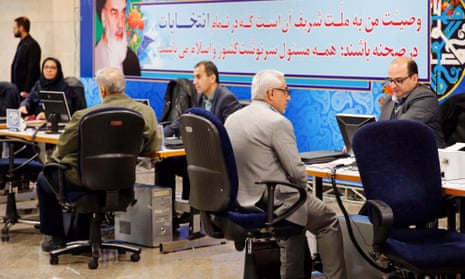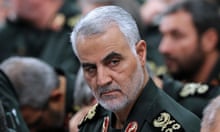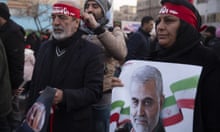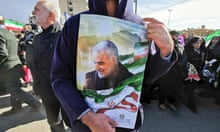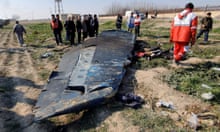Iran’s clerical establishment is so determined to fix this month’s parliamentary elections that hardliners are likely to sweep to power, bringing closer the final collapse of the Iran nuclear deal, according to western diplomats.
Reformist candidates have been systematically purged from the elections due on 21 February after vetting by the Guardian Council, a 12-strong body of lawyers and religious leader appointed indirectly by the supreme leader, Ayatollah Ali Khamenei.
More than 90 of the 290-strong parliament have been barred from running for re-election, often receiving short letters giving broad justification ranging from financial irregularities to not being faithful to Islam.
Among the 16,000 people who applied to stand in the elections, about 9,000 have been disqualified. The process, enshrined in law, is justified on the grounds that Iran does not have permanent political parties to filter candidates.
A council spokesman, Abbas-Ali Kadkhodaei, cited “multiple grounds” on which candidates had been rejected, including alleged corruption, embezzlement, drug use or dealing.
But Iran’s reformist policy-making High Council claimed last month there had been bias against its candidates, saying 90% of them had been debarred.
It said that if the Guardian Council did not relent, reformists would have no candidates in 230 of the 290 seats, and in 160 constituencies there would be no competitor, turning the democratic process into an appointments process. In a further 70 seats there would be a form of competition, but only between strands of “principalists”, as hardliners are known. The figures are hard to verify independently.
Even the president Hassan Rouhani’s chief of staff, Mahmoud Vaezi, has complained that candidates’ views on issues such as the nuclear deal has led to disqualifications. In some parts of the country the reformists have decided not to run a list.
The controversy has deepened in the last few days after claims by one disqualified MP, Mahmoud Sadeghi, that middlemen were offering barred candidates the chance to run if they paid large bribes. Arrests have been made after Sadeghi produced tape recordings to back his claim.
In all 10 parliamentary elections since 1980, the Guardian Council has rejected anywhere from 15-49% of candidates who registered to run, so this year’s purge is probably the biggest since the revolution in 1979. Pictures have emerged on social media showing a horse reaching the winning post, satirising the one-horse nature of some of the contests.
An appeals process exists, but some reformists including in Tehran have decided not to run and to instead focus on rebuilding a civic activist base.
Diplomats see the purge as confirmation of its prediction that Donald Trump’s policy of maximum pressure will not weaken the hardline regime but instead tilt politics away from reformists advocating limited engagement with the west.
Sanam Vakil, a deputy director for the Middle East programme at Chatham House, said: “Although the parliament largely is focused on bread and butter issues and has no direct control of foreign policy, it can contribute to a hardline populist atmosphere creating a climate around foreign policy. It can, for instance, call for the impeachment of the president, and has in the past.”
She added: “The results will also set the context for the presidential elections next year, and for the succession to Khamenei.”
Ellie Geranmayeh, a senior policy fellow at the European Council on Foreign Relations, said the regime was only damaging itself. “If Iran’s Guardian Council resort to mass disqualification of the reformists to weaken the Rouhani government, then this will only further erode the legitimacy of the parliamentary system with few benefits, since the voter turnout in favour of the reformist camp was already expected to be very low.”
She added: “A swing of parliament to a conservative and hardline majority will make political life harder for the remaining supporters of the Iran nuclear deal in government.” It could create major headaches if not nightmares for the Rouhani administration, she said.
In an effort to crack down on criticism of the process on social media and in the press, the Iranian authorities this week raided the homes of four journalists, according to the Committee to Protect Journalists. Iran’s judiciary chief, Ebrahim Raisi, said: “Whatever their motives, anyone who questions the electoral process, whether he knows it or not, he is on the enemy’s side by weakening the process.”
Yet Rouhani has criticised the disqualifications, saying: “We cannot simply announce that 1,700 candidates have been approved and ignore the question of how many political groups those people represent. That’s not what an election is about.”
In the 2016 election, a bloc of reformists, centrists and moderate conservatives won 41% of parliamentary seats. Hardliners won 29% and independents took 28%.
But the reformists have found the limited powers of the parliament in a multilayered government have provided a difficult platform from which to advance their social agenda.
It is expected turnout will be low this time, something the government wants to avoid. Farideh Farhi, an Iranian expert at the University of Hawaii, said: “Turnout matters hugely, particularly in large cities. When people come out to vote, reformist candidates are more likely to win. In this election, the vetting body and powers that be have probably figured that turnout will be low.”
Vakil predicted that if the reformists went into opposition, it may spark a deep reflection on what reformism means within Iran.
